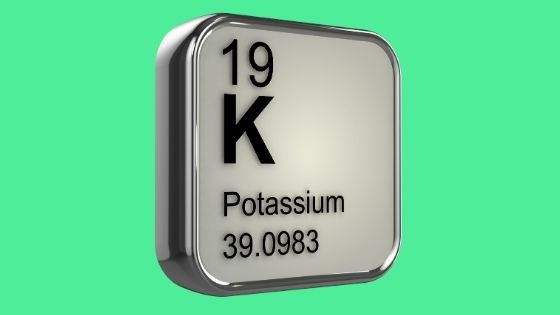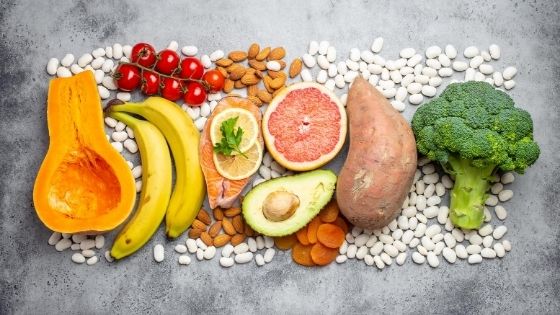With the chemical symbol K, potassium is the 19th element in the periodic table. You may not be aware that we need more of it than any other mineral in our diet. Below, we'll look at what potassium does in the human body and how much you need to be healthy.
More...
What is potassium?
In its pure metallic state, potassium a silvery, soft and highly reactive metal that reacts explosively on contact with water. In nature and biological systems though, it's is found in its ionic form. So, relatively unreactive and highly soluble in water.
The high solubility of these ions has nutritional consequences for the way we use it in the body.
Why do we need potassium?
Potassium ions are positively charged and can move very quickly across cell membranes as well as inside our cells.
As a result, nature exploits this by harnessing potassium to generate electrical impulses in the body. These are used to send nerve signals and contract our muscles.

Element number 19 in the periodic table
It's also the main mineral present inside the trillions of cells in your body. As a result, it's crucial for maintaining cell structure and water balance.
Moreover, it's intimately involved in glycogen synthesis, carbohydrate breakdown and protein metabolism.
How much potassium do I need?
Potassium is needed in larger amounts than any other mineral.
The current Australian Adequate Intake (AI) levels are established as 3800mg/day for adult males. However, for adult females the recommendation is 2800mg/day.
It’s important to understand that the potassium/sodium balance is just as important as absolute sodium intake.
For instance, the higher the sodium (salt) content of our diet, the more potassium that’s needed to maintain balance.
A balanced diet in this respect might contain 500-2000mg of sodium and 2000-5000mg of potassium. That is to say roughly 3 or 4 times as much potassium as sodium.
However, modern Western diets containing salty processed foods can easily result in a complete reversal of this balance.
Where can I find potassium?
Potassium is well supplied in most natural unprocessed foods. For example, fresh and dried fruits and juices are particularly rich sources. Think bananas, orange juice, apricots, grapes and raisins.

Natural, unprocessed foods are great sources of potassium for our diet
In addition, vegetables (such as avocados and potatoes) and lean meats are also great sources. Since it is highly soluble, cooking or processing food generally lowers the amount available.
What happens if I don’t get enough?
A severe potassium deficiency is rare.
It causes muscle weakness and arrhythmias, as heart function may be affected.
However, longer-term chronic deficiencies associated with high sodium/low potassium western diets are much more common. Although less severe, these have been linked to a number of conditions and symptoms. For example - high blood pressure, impaired bone metabolism, cramps and general lethargy, irritability, fatigue and delayed recovery after exercise.
Who should take the most care to maintain potassium intake?
Athletes and people who regularly exercise have higher potassium needs.
Up to 3000mgcan be lost in one day by sweating alone.
Others at risk of potassium deficiency include those whose diets include significant amounts of salty processed food.
Similarly, high intakes of junk and fast food can also result in a disruption of balance. Meanwhile, those on certain medications such as diuretics and laxatives may also be affected, as well as diabetics.
Can I get too much?
It’s virtually impossible to get too much dietary potassium.
That being said, those with kidney disease usually need to restrict their intake. Most importantly, they must follow the doctors’ dietary recommendations. Since so many natural foods are rich sources, supplementation is not normally needed or recommended in healthy adults.
Further to this, some potassium supplements can be quite irritating to the stomach.
Above all though, there can be medical exceptions - you should always follow specialist medical advice.
Am I getting enough potassium?
Use this table to see whether your diet is likely to contain enough.
As you'll see, the best sources are fruits, vegetables, nuts and seeds, pulses and lean meat. Conversely, processed and refined foods generally contain less. In addition, they usually contain added salt (sodium) which makes for a far less favourable sodium/potassium ratio.
Food | Portion Size | Potassium content (mg) |
|---|---|---|
Dates | 100g | 730 |
Prunes | 100g | 700 |
Raisins | 100g | 680 |
Baked potato | 100g | 606 |
Chestnuts (roasted) | 100g | 574 |
Sunflower seeds | 100g | 460 |
Avocado | 100g | 450 |
Tuna | 100g | 444 |
Potatoes (boiled) | 100g | 367 |
Beef | 100g | 350 |
Banana | 100g | 346 |
Wholemeal flour | 100g | 315 |
Melon (rockmelon) | 100g | 215 |
Tomatoes | 100g | 210 |
Oranges | 100g | 190 |
White flour | 100g | 170 |
Milk (reduced fat) | 100ml | 166 |
Orange Juice | 100ml | 152 |
Lentils (boiled) | 100g | 144 |
Cottage cheese | 100g | 123 |
Pears | 100g | 100 |
Cheddar cheese | 100g | 73 |
White rice (boiled) | 100g | 25 |
Energy Drink | 100ml | 0 |
*Figures supplied by Australian Food Composition Database FSANZ | ||
